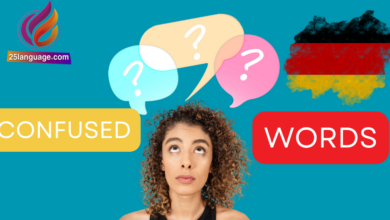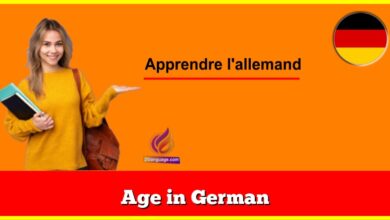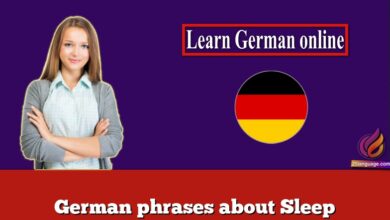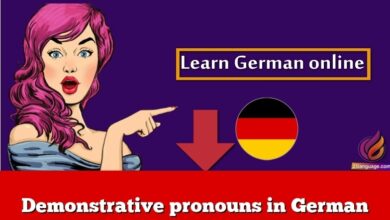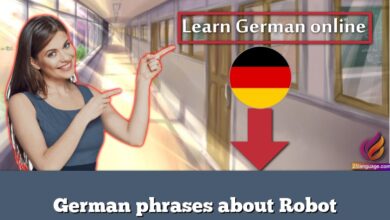Verbs in German Grammar

Verbs in German (Verben) (also: Tätigkeitswort, Tuwort or Zeitwort) are doing words. They can express actions performed by the subject of the sentence as well as states, concepts and processes.
There’s a lot to consider when dealing with German verbs: Hilfsverb or Vollverb? Finite or infinite? Transitive or intransitive? Personal or impersonal? It’s easy to get overwhelmed by all the grammar jargon.
Weak, strong or mixed?
German verbs are conjugated; they change their form according to the tense and the subject of the sentence
Example: ich gehe, du gehst, er/sie/es/man geht, wir gehen, ihr geht, sie gehen (Präsens)
Like other languages, German has regular and irregular verbs, but we can also classify German verbs as being weak (schwach), strong (stark) or mixed (gemischt).
Weak verbs (schwache Verben) are regular verbs:
- Weak verbs are conjugated by simply adding an ending to the stem, which remains the same for every form
Example: ich lerne, du lernst, … (Präsens)
ich lernte, du lerntest, … (Präteritum- We form the past participle (Partizip II) of weak verbs with ge…t.
Example gelernt
Strong verbs (starke Verben) are irregular verbs:
- Strong verbs change their stem in Präteritum and/or past participle. Some strong verbs also change their stem in certain present tense forms.
Example: ich fahre, du fährst, … (Präsens)
ich fuhr, du fuhrst, … (Präteritum)
- We form the past participle of strong verbs with ge…en
Example: gefahren
Mixed verbs (gemischte Verben) are also irregular. Their conjugation is a mix (get it?) of strong and weak:
- Like strong verbs, mixed verbs also change their stem in the Präteritum and/or past participle
Example: rennen – rannte – gerannt
- However, unlike strong verbs, we form the past participle of mixed verbs in the same way as weak verbs: with ge…t
Example: gerannt
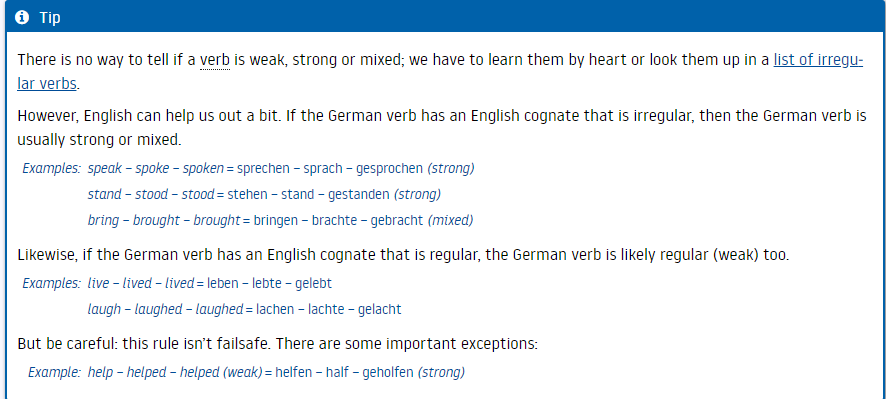
Main verbs, auxiliary or modal verb?
We can categorise verbs into the following three types: main verbs (Vollverben), auxiliaries (Hilfsverben) and modal verbs (Modalverben).
Main verbs (Vollverben) express an action, state or process.
- Example:
- Ihr baut ein Haus.
Auxiliary verbs (Hilfsverben) have a strictly grammatical function and have no meaning of their own. Auxiliary verbs work together with main verbs to form compound tenses and the passive. The German auxiliary verbs are sein, haben and werden.
- Examples:
- Ihr habt ein Haus gebaut. (Perfect)
- Ihr werdet ein Haus bauen. (Future I)
- Das Haus ist gebaut worden. (Passive)
- in these examples the main verb is bauen, this conveys meaning while the auxiliaries only fulfil a grammatical role
Modal verbs (Modalverben) come before main verbs and express things like permission, obligation, advice, ability, etc. The German modal verbs are dürfen, können, mögen (möchten), müssen, sollen, wollen.
- Example:
- Ihr wollt ein Haus bauen.
To learn more about main verbs, auxiliaries and modals, check out our page dedicated to German modal verbs or read up on the difference between the auxiliaries haben and sein.
Separable or non-separable?
We can add prefixes to many German verbs to change their meaning.
- Example:
- stehen = stand
- but: aufstehen = get up
Verbs with prefixes can be separable (trennbar) or non-separable (nicht trennbar).
- Separable verbs: the prefix is separated from the main verb. It comes at the end of the sentence in Präsens and Präteritum and is attached to the beginning of past participles that start with ge-.
- Example:
- aufstehen: Ich stehe normalerweise um sieben auf.
- Heute bin ich um acht aufgestanden.
- Non-separable verbs: The prefix remains attached to the verb. The past participle of non-separable verbs is not formed with ge-.
- Example:
- verschlafen: Ich verschlafe normalerweise nie.
- Heute habe ich verschlafen.
Note: Some verbs with prefixes have different meanings depending on whether they are separable or not.
- Example:
- Wir haben die Möbel umgestellt.
- umstellen (separable) = rearrange
- Die Polizei hat das Haus umstellt.
- umstellen (non-separable) = surround
Learn more about the difference between separable and non-separable verbs in German grammar.
Reflexive verbs
Reflexive verbs (reflexive Verben) are formed with a reflexive pronoun. With reflexive verbs, the subject and the object of the verb are the same.
- Example:
- Ich sehe mich im Spiegel.
- I am both looking and being looked at
Learn more about reflexive verbs in German grammar.
Transitive or intransitive?
In the dictionary, transitive and intransitive verbs are marked with the letters vt and vi. But what does transitive or intransitive actually mean?
Transitive verbs take an accusative object (Wen/Was?).
- Example:
- Ich nehme den Zug.
Without an accusative object, their meaning is incomplete.
- Example:
Ich nehme. → What am I taking? A bus? Medication? A bath?
Intransitive verbs do not take an accusative object. These verbs can stand alone and still make complete sense.
- Example:
- Ich warte an der Kreuzung.
- an der Kreuzung is not an object, it just tells us where the action is happening
Transitive and intransitive verbs in the passive
We can only form passive sentences with transitive verbs. This is because the accusative object of an active sentence is needed to become the subject of the passive sentence.
- Example:
- Er klaute das Fahrrad. (active)
- → Das Fahrrad wurde geklaut. (passive)
Intransitive verbs only exist in the impersonal passive. This form is often used to give orders. The impersonal passive can take the pronoun es or an adverbial phrase (jetzt, gestern …) as its subject.
- Examples:
- Es wird gewartet.
- An der Kreuzung wird gewartet.
Learn more about transitive and intransitive verbs in German grammar, or check out some exercises on forming the passive in German.
Personal or impersonal?
We can distinguish between personal and impersonal verbs in German.
Most verbs are personal verbs (persönliche Verben); they can be used with all subject pronouns and with a noun in the 3rd person forms.
- Example:
- gehen: ich gehe, du gehst, er/der Mann geht, wir gehen, ihr geht, sie/die Leute gehen
A handful of personal verbs only exist in the 3rd person singular/plural.
- Example:
- geschehen: es/ein Unglück geschieht, Wunder geschehen
- not:
ich geschehe, du geschehst …
Impersonal verbs (unpersönliche Verben) can only take the pronoun es as their subject. It is not possible to use these verbs with a noun as their subject. The most common impersonal verbs are weather verbs.
- Examples:
- es blitzt, es donnert, es hagelt, es regnet, es schneit, es stürmt
Indicative, subjunctive or imperative?
The indicative, subjunctive and imperative are all moods (der Modus). The mood of a sentence gives context to the verb; it tells us the speaker’s intention.
The indicative (der Indikativ) is the default mood. It presents information as fact and grounded in reality.
- Example:
- Ich komme zur Party und ich habe schon ein Geschenk.
The subjunctive (der Konjunktiv) indicates that the information being presented has an element of possibility, fantasy, impossibility or doubt. We can often translate the subjunctive with English phrases like would, should and could. In German, there are two types of subjunctive: Konjunktiv I and Konjunktiv II.
The subjunctive mood is used for:
- sentences with wenn that express something that can only occur if a certain condition is fulfilled
- Example:
- Ich käme zur Party, wenn ich ein Geschenk hätte.
- reported speech (when the speaker wishes to distance themselves from the information being repeated)
- Example:
- Petra sagt, sie komme zur Party und sie habe auch schon ein Geschenk.
- wishes
- Example:
- Ich wünschte, ich hätte schon ein Geschenk.
The imperative (der Imperativ) gives orders and commands to one person or more.
- Example:
- Komm zur Party! Bring ein Geschenk mit!
Learn more about the tenses in the indicative, subjunctive and imperative.
Finite or infinite?
The conjugated forms of the verb are also known as finite forms. The conjugated form of the verb always occupies second position in a main clause. The first position is occupied by the subject or an adverbial phrase (time, place, manner, etc.).
- Examples:
- Luisa zeigte aufgeregt am Abend dem Bruder ihre Medaille.
- Am Abend zeigte Luisa aufgeregt dem Bruder ihre Medaille.
The non-conjugated forms of a verb are known as the infinite forms. Infinite forms are invariable (they do not change their form) and they occupy the final position in a main clause. The infinite verb forms in German are:
- The infinitive: this is the basic form of the verb. We use the infinitive in tenses like Future I or after modal verbs.
- Examples:
- Ich werde dich anrufen.
- Sie kann schwimmen.
- The infinitive with zu: certain words take the infinitive with zu.
- Example:
- Ich freue mich, dich zu sehen.
- The past participle (Partizip II): the past participle appears in the compound tenses (Perfect, Pluperfect, Future II) as well as the passive.
- Examples:
- Ich habe heute lange geschlafen.
- An der Grenze wurden alle Ausweise kontrolliert
- You can learn more about German verbs, and download German Keyboard translator.


